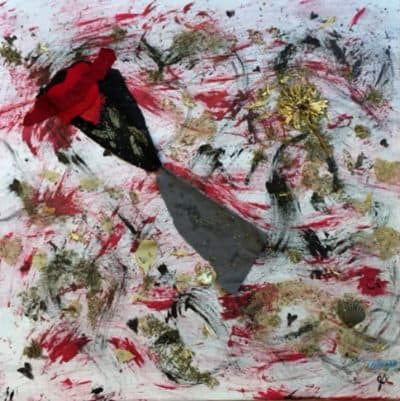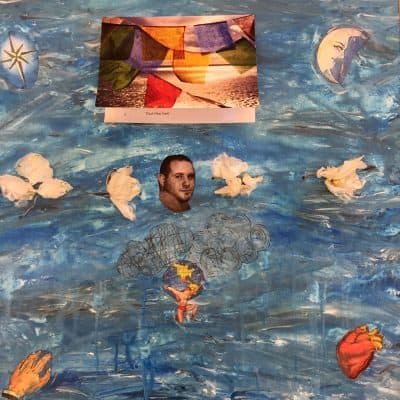Advertisement
Art, Stories That Honor Those Who Died By Drug Overdose — And Help Survivors Too
Angela Kelly’s brother, Jonathan, died in February, at the age of 35, after struggling with heroin and alcohol addiction for years. He had been off drugs in the months leading up to his death, doing well in recovery until he lost a bed in a halfway house. An overdose on New Year's Day left him hospitalized in a coma. Though he eventually woke up, he died in the hospital.
For Angela, working on an art project and sharing stories about Jonathan's life and death made her feel connected to her older brother, who was himself an artist, giving her a new way to honor his creative spirit and to remember him as a whole person — more than his addiction.
Angela joined others who have also lost a family member to opioid addiction as part of a trauma workshop held jointly by me, a Boston internist, and artist Nancy Marks. As a doctor, I know that there's no pill or treatment I can prescribe to alleviate such grief. But for many participants in our workshop, the very act of creating a symbolic tribute to their deceased relative provides some level of comfort.
“Jonathan, I want you to know how much you are loved," Angela said, speaking of her brother. "Addiction brings so much shame and guilt, and I want you to know that we love you for who you were at your core. I know you worked so hard, Jon, to make us proud and to make yourself proud and to overcome the struggles you faced, and I will do everything I can to honor both your struggles and your triumphs.”

Another participant, Judy Skinner, who lost her son Garret to heroin overdose two years ago, initially couldn’t figure out how to symbolize her son on a flat canvas as part of an art collage. But she settled on a flower from his funeral, a piece of his favorite sweatshirt, and “a perfect little seashell” as a memory of their times at the beach when he was a young child. “I hope he’s perfect now,” she said.
Garret had been living on the street for a few years, lost in his addiction and estranged from his family. Still, his death hit Judy hard. “You’re never prepared,” she said. Judy said the workshop left her feeling “more calm and a little more confident.”
Each participant chose a meaningful image to focus on: For Bryan, whose son died at age 22, it was a picture of a snowmobile; for Robyn, whose son died at 20, it was a clown hat.
The workshops were developed around the belief, supported by research, that creating art and telling stories is therapeutic. Moreover, research shows that people remember information more clearly when it is conveyed in narrative format. Sharing the stories of those who have died can help us remember their humanity: these are people who were loving and well loved, and not just addicts.
Advertisement
The escalating opioid crisis has been prominent in recent news. By conservative estimates, 80 Americans died each day from opioid overdose in 2014, making drug overdose the leading cause of accidental death. In Massachusetts, opioid overdose deaths increased by nearly 50 percent between 2012 and 2014, and this increase has continued over time, with a confirmed 1,379 opioid-related deaths in 2015, representing an 8 percent increase from the 1,282 confirmed deaths in 2014.
Gov. Charlie Baker has convened an Opioid Addiction Working Group and launched efforts to curb these preventable deaths. New rules will improve screening and treatment for opioid addiction, more tightly regulate opioid prescriptions, and make the life-saving opioid-reversing drug, Narcan, more widely available.
Prevention, of course, is essential, but what about all those left behind to grieve these senseless deaths? With the opioid epidemic skyrocketing across all socioeconomic classes, many Massachusetts families have lost, or know someone who has lost, a loved one to overdose. These individuals must grieve while surrounded by a culture that often vilifies and blames both addicts and their families. The loss of a loved one is always difficult and painful, but grief is especially complicated when a person dies from a stigmatized condition like a drug overdose.
Grieving in this context can be confusing and intensely isolating with the added pain of stigma and shame.
To offer support for these families, I joined with Nancy to run a series of free art and storytelling workshops open to the public. Building on my work using storytelling as a therapeutic tool and Nancy’s work leading art workshops to promote healing in the face of grief and loss, we hope to create a forum for family members to express and process grief in a community of others facing similar loss.
Our goal is to promote healing by highlighting the worthiness of those who have died.

Participants are guided through the process of creating collages and paintings and telling stories about their loved one. We encourage the artists to bring meaningful objects that remind them of the person who has died as an inspiration for their collages.
Angela, for instance, incorporated orchids from Jonathan’s funeral as well as a poem about the moon he had copied into his treatment journal. The blues that make up the background represent the ocean because Jonathan loved the sea, and the picture of Atlas carrying the Earth signifies Jonathan’s pain, as though he were bearing the weight of the world on his shoulders.
Participating artists also record audio stories that we edit and pair with each art piece. The process of creating this mixed media work gives grieving family members the space, time and tools to work through their emotions with the ultimate creation of a finished piece to honor the dead.
After completing three workshops, we will curate a community art exhibition to share art and audio pieces with the public, and to bring together all participants. Our hope is that this community event will increase public awareness, knowledge and tolerance while at the same time providing a space for grieving families to honor their loved ones without shame.
The next workshop will be held in September. If you want to learn more, please contact me or Nancy Marks.
Dr. Annie Brewster, a Boston internist, is a regular contributor to CommonHealth.